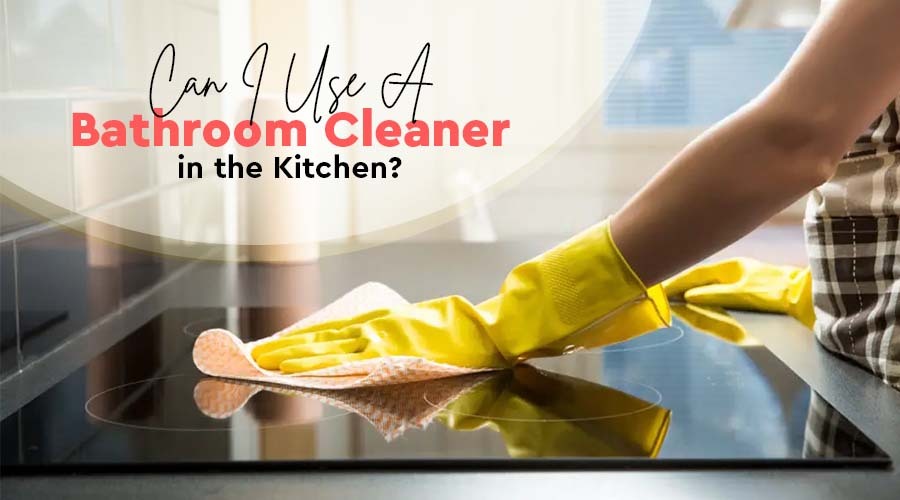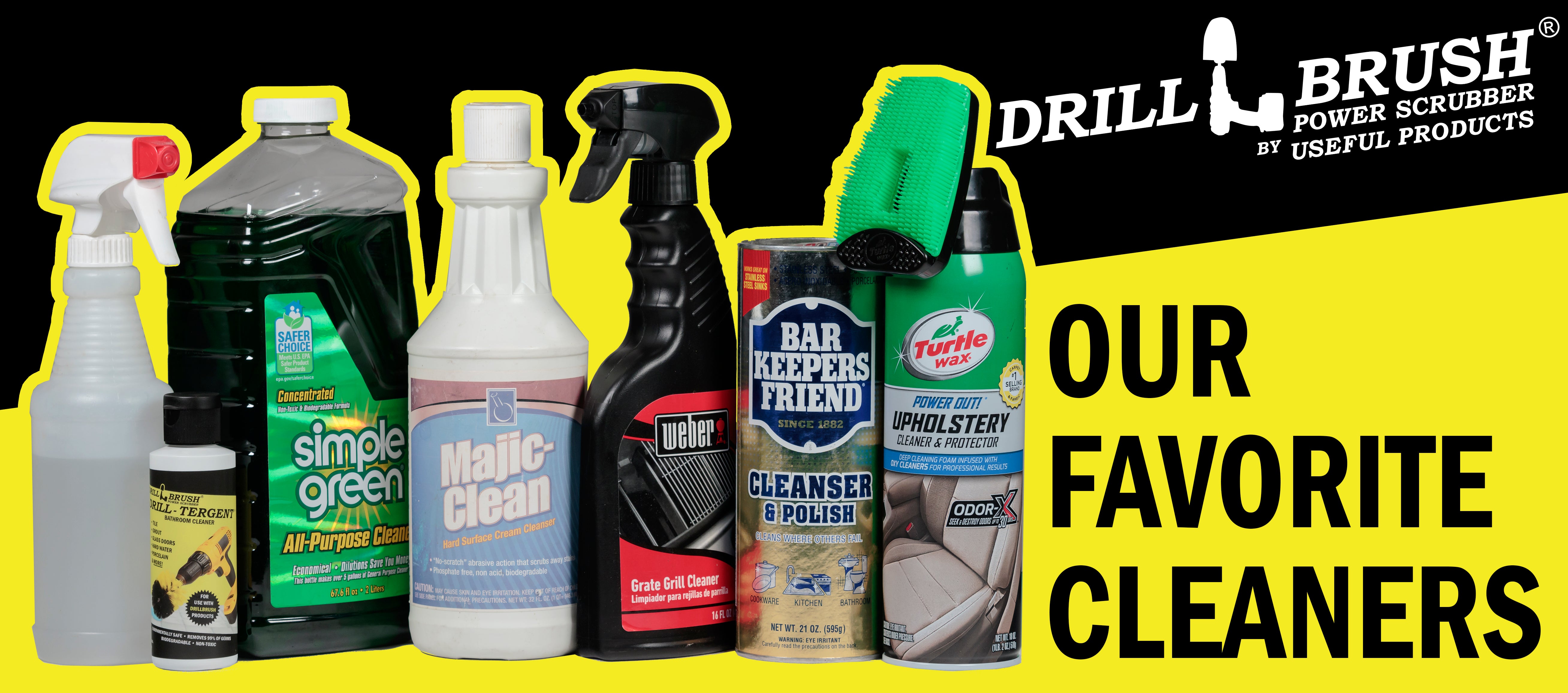Have you ever stood in your bathroom, staring at the mess, and wondered if you could just grab your trusty kitchen cleaner to tackle the grime? You’re not alone.
Many of us are tempted to simplify our cleaning routine by using one product for multiple purposes. But is it really a good idea to use kitchen cleaner in the bathroom? Understanding the nuances of cleaning products can save you time, money, and perhaps even protect your surfaces and health.
We’ll dive into the reasons why this might be a smart move—or why you should think twice. Stick around to discover how you can optimize your cleaning routine without compromising on effectiveness or safety.
Understanding Kitchen And Bathroom Cleaners
When you’re cleaning your home, you might wonder if you can use kitchen cleaner in the bathroom. Understanding the differences between kitchen and bathroom cleaners can help you make the right choice for each space. It’s not just about grabbing the nearest bottle; it’s about knowing the ingredients and their purposes.
Ingredients In Kitchen Cleaners
Kitchen cleaners are specially formulated to tackle grease and food residues. They often contain surfactants, which break down oils and fats. Many include antibacterial agents to kill germs left behind by raw food.
Some kitchen cleaners might have bleach or ammonia for tough stains. These ingredients are great for sanitizing countertops, but can be harsh on bathroom surfaces like tile grout.
Ingredients In Bathroom Cleaners
Bathroom cleaners focus on removing soap scum, mineral deposits, and mold. They often contain acids like citric acid or vinegar, which dissolve minerals from hard water and tackle mildew.
Bathroom cleaners might also include disinfectants to handle bacteria in humid environments. Their formulations ensure they clean effectively without damaging fixtures.
So, should you use kitchen cleaner in the bathroom? Consider the task at hand. While some ingredients overlap, others might not be suitable. Have you ever tried using a kitchen cleaner in the bathroom? Did it work as expected? Knowing what’s inside each cleaner can guide your choice.

Credit: fominsoap.com
Safety Concerns
Using kitchen cleaner in the bathroom raises safety concerns. Some ingredients may harm bathroom surfaces or react poorly with other cleaning products. Always check labels and ensure proper ventilation to avoid risks.
When thinking about using kitchen cleaner in the bathroom, safety concerns should be top of mind. Many of us have found ourselves mid-cleaning spree, wondering if we can simplify our chores by using one product for multiple tasks. But before you reach for that kitchen cleaner, it’s important to consider the potential risks involved. Let’s delve into the details to ensure your cleaning spree doesn’t turn into a safety hazard.Chemical Reactions
Mixing cleaning products can sometimes lead to unwanted chemical reactions. Kitchen cleaners often contain ammonia, while bathroom cleaners may have bleach. If these two chemicals meet, they create a toxic gas called chloramine, which is harmful to breathe. Imagine scrubbing your bathroom surfaces and suddenly feeling dizzy or short of breath. That’s a scenario you definitely want to avoid. Always read labels and avoid mixing products that aren’t meant to be combined.Potential Health Risks
Using a cleaner not intended for certain surfaces can also pose health risks. Kitchen cleaners may contain harsh chemicals designed to cut through grease, which might irritate your skin or eyes in an enclosed bathroom space. Think of the times you’ve been splashed with cleaner and how it stung your skin. In a bathroom, with less ventilation, these chemicals can linger in the air, increasing the risk of respiratory issues. Ask yourself if it’s worth the risk or if a bathroom-specific cleaner might be a safer bet. Ultimately, knowing what’s in your cleaning products and how they interact is crucial. By taking a few moments to consider these safety concerns, you can ensure a cleaner home without compromising your health. Have you ever encountered unexpected reactions when cleaning? Share your experiences and tips for staying safe while keeping your space sparkling.Efficiency And Effectiveness
Have you ever stood in your bathroom with a kitchen cleaner in hand, wondering if you could use it there? You’re not alone. Many of us have been tempted by the idea of a versatile cleaner that can tackle multiple spaces. The key questions are: is it efficient and effective? Let’s dive into the details.
Cleaning Power Comparison
Kitchen cleaners are designed to handle tough grease and food residues. Think about the stubborn grime on your stove. These cleaners pack a punch, often with strong degreasers. In the bathroom, while soap scum and mineral deposits are common, grease isn’t. So, the cleaning power might not be perfectly suited.
You might find that your kitchen cleaner is overkill for some bathroom tasks. Imagine using a sledgehammer to crack a nut. It works, but it might not be the best tool for the job. Consider whether the cleaning power aligns with the specific grime and dirt in your bathroom.
Surface Compatibility
Bathrooms have a variety of surfaces—tiles, porcelain, and sometimes natural stone. Kitchen cleaners may contain chemicals that can damage these surfaces, especially natural stone. You wouldn’t want to ruin your bathroom countertop, right?
Check the label on your kitchen cleaner. It might warn against use on certain materials. If you’re in doubt, test it in a small, hidden area first. This precaution can save you from unexpected damage.
Does it make sense to use a cleaner that might harm your surfaces? If you’re trying to save time and effort, you don’t want to end up with a costly repair job. Weigh the risks carefully before deciding.
So, is using kitchen cleaner in the bathroom efficient and effective? It could be, but it’s not without its risks. Consider the cleaning power and surface compatibility before making your choice. What’s your experience been like? Have you found a cleaner that works for both spaces, or do you stick to specialized products?
Environmental Impact
Kitchen cleaners might work in the bathroom, but be cautious. Some ingredients can harm surfaces or the environment. Always check labels to ensure safe use and minimize environmental impact.
When considering whether to use kitchen cleaner in your bathroom, it’s essential to think about the environmental impact. Many conventional cleaners contain harsh chemicals that can harm the environment. They wash down the drain and can affect water quality and marine life. Understanding the environmental impact of your cleaning choices is crucial for making more sustainable decisions.Biodegradability
Biodegradability is a key factor in determining the environmental impact of a cleaner. A biodegradable cleaner breaks down naturally over time without harming the ecosystem. Check the labels on your cleaning products to see if they are biodegradable. Non-biodegradable products can linger in the environment, causing long-term damage. These products may contribute to pollution and disrupt natural processes. Opting for biodegradable options helps reduce your ecological footprint.Eco-friendly Alternatives
Eco-friendly alternatives are a great way to minimize environmental harm. Products made from natural ingredients are often less toxic and safer for the planet. Vinegar and baking soda, for example, are effective cleaning agents and are environmentally safe. Consider making your own cleaning solutions using simple household ingredients. This not only benefits the environment but can also save you money. Have you ever tried mixing lemon juice with baking soda for a sparkling clean? By choosing eco-friendly alternatives, you contribute to a healthier planet. It’s a simple change that can make a significant difference. What small step will you take today to protect the environment?Expert Recommendations
Using kitchen cleaner in the bathroom raises many questions. Safety, effectiveness, and recommendations vary widely. Experts advise caution and provide clear guidelines. Their insights help ensure safe and effective cleaning.
Professional Cleaning Tips
Experts stress choosing the right product for each surface. Kitchen cleaners often contain degreasers. These might not suit bathroom surfaces. They can damage or discolor certain materials. Always read labels and test in small areas first. This helps prevent unwanted results.
Alternatives For Safe Cleaning
Consider specialized bathroom cleaners for specific needs. They often contain disinfectants. These kill germs effectively. Vinegar and baking soda are natural options. They’re safe for most surfaces. They clean without harsh chemicals. Essential oils can add a pleasant scent. They also offer some antibacterial properties.

Credit: fominsoap.com
Diy Cleaning Solutions
DIY cleaning solutions offer a budget-friendly and eco-friendly approach to home cleaning. Many people wonder if kitchen cleaners can be used in the bathroom. The answer lies in understanding the ingredients and their effectiveness. Creating your own cleaners can be both fun and rewarding. Let’s explore how you can make effective cleaning solutions at home.
Homemade Cleaner Recipes
Making your own cleaners is simple and cost-effective. A basic recipe combines vinegar, baking soda, and water. Mix one cup of vinegar with one cup of water. Add two tablespoons of baking soda. This mixture works well for cleaning sinks and tiles.
Another recipe involves lemon juice and baking soda. Mix half a cup of lemon juice with one cup of baking soda. This paste is perfect for scrubbing tubs and toilets. It leaves a fresh scent and removes grime easily.
Natural Ingredients For Cleaning
Naturally derived ingredients clean effectively without harsh chemicals. Vinegar is a powerful cleaner due to its acidity. It kills bacteria and removes stains. Baking soda acts as a gentle abrasive. It helps scrub away tough stains and odors.
Lemon juice is another great natural cleaner. It has antibacterial properties and leaves a fresh scent. Essential oils like tea tree or lavender can be added for fragrance. They also have antimicrobial properties that boost cleaning power.
These natural ingredients are safe and easy to find. They provide an effective alternative to store-bought chemical cleaners.
Common Myths
Many believe kitchen cleaners work in bathrooms too. Ingredients differ and could harm bathroom surfaces. Always check labels for safety.
When it comes to cleaning, we often have our trusted products that we swear by. But what happens when you’re faced with tackling a mess in a different room than your usual? Can you use kitchen cleaner in the bathroom? This is a question that’s surrounded by many myths and misconceptions. Let’s dive into the common myths and truths about using kitchen cleaner in the bathroom.Misconceptions About Cleaners
Many people believe that kitchen cleaners are exclusively designed for food-related messes. You might think they are ineffective against soap scum or hard water stains in the bathroom. Some even worry about potential damage to bathroom surfaces. But is this fear justified? Kitchen cleaners often boast powerful degreasing agents. These can effectively cut through grime in any room. While specific bathroom cleaners might target mold or mildew, kitchen cleaners can still tackle the everyday mess.Truth About Multi-purpose Cleaners
Multi-purpose cleaners have gained popularity for a reason. They promise versatility and ease of use. You might already have one in your cleaning arsenal without realizing its full potential. These cleaners can often handle both kitchen spills and bathroom grime with ease. Next time you’re cleaning, consider trying your kitchen cleaner in the bathroom. You may find it works just as well. Always read the label to ensure it’s safe for your surfaces. So, can you use kitchen cleaner in the bathroom? The answer might be simpler than you think. Are you ready to challenge the myths and embrace the truth?
Credit: drillbrush.com
Frequently Asked Questions
Can Kitchen Cleaner Be Used On Bathroom Tiles?
Yes, most kitchen cleaners can be used on bathroom tiles. They are effective at removing grime and soap scum. However, it’s essential to check the cleaner’s label to ensure it’s safe for bathroom surfaces. Always test a small area first to prevent any damage.
Is Kitchen Cleaner Safe For Bathroom Sinks?
Generally, kitchen cleaners are safe for bathroom sinks, especially stainless steel or ceramic ones. They help remove tough stains and grease. Ensure the cleaner is non-abrasive to avoid scratches. Follow instructions on the label for best results, and rinse thoroughly after cleaning.
Can Kitchen Cleaner Disinfect Bathroom Surfaces?
Many kitchen cleaners have disinfecting properties suitable for bathroom surfaces. They effectively kill germs and bacteria. It’s important to follow the manufacturer’s instructions for proper disinfection. Allow the product to sit for the recommended time to ensure maximum effectiveness.
What Surfaces Should Kitchen Cleaner Avoid In Bathrooms?
Avoid using kitchen cleaner on porous bathroom surfaces like natural stone or unsealed grout. They may cause damage or discoloration. It’s crucial to read the cleaner’s label for restrictions. Consider using a specialized bathroom cleaner for sensitive materials to ensure safety.
Conclusion
Using kitchen cleaner in the bathroom can be convenient. It’s essential to ensure safety first. Check the cleaner’s label for compatibility. Some kitchen cleaners work well for bathroom surfaces. Others might damage delicate fixtures. Always test on a small area first.
This ensures no harm to your bathroom surfaces. Keep your bathroom fresh and clean with the right products. Remember, proper cleaning tools make the job easier. Choose wisely for a spotless home. Regular cleaning prevents grime buildup. Save time and effort by picking versatile cleaners.
Enjoy a tidy bathroom with minimal fuss. Happy cleaning!

As the chief content writer, Hassan Al Sarker works as a professional kitchen-based content creator at Kitchen Liker.
In addition to reviewing the content published on Kitchen Liker, he ensures that it is accurate, relevant, and helpful. As a result, all the reviews and information published at Kitchen Liker are neutral and userfriendly.
Hassan Al Sarker has a bachelor’s degree in Hotel and Tourism Management From the Newyork University. Before joining Kitchen Liker, he was a contributor at Kitchen Club, United States.
